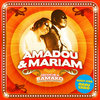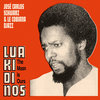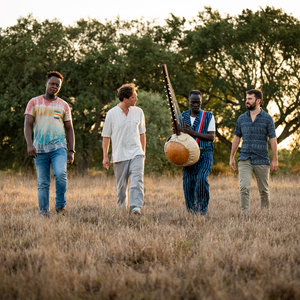Mira Kendô by Mira Kendô

Braima Galissa: The Unlikely Hybrid
I came to know Braima Galissa gradually. Not in a specific moment, but over the course of years. By the time we became close friends and started working together, we were already unable to pinpoint the exact origin of our friendship. Braima is a cultural figure of crystalline talent, faced with a bitter ambiguity; On one hand, he is a disciplined and meticulous artist who has reached a rare level of performance, collaborated with some of the biggest names in the portuguese music scene such as Sara Tavares and General D, has played the Kora every day for 55 years, and imposes a style that is particularly technical, sophisticated, and absorptive of all valuable musical languages around him. On the other hand, the architecture of European cultural customs outlined limits that he always rejected but found impossible to ignore. Time and again, representing him before the interest - more or less formal - of record labels in recording and releasing his songs, we would hear definitive pre-production proposals or plans consisting solely of Braima, alone, playing his songs on the Kora, singing. Without a metronome, without effects; “Pure." And without any interest in listening to the artist himself who, repeatedly in various languages and over grammatical variations, asserted that his music was dance music, created for a band of at least five members. These independent labels, well-versed in the obscure names of Jazz, never realised the arbitrariness of their arrogance; would this paternalism also be calmly explained to disciples of Weather Report? The historical identity of the Djidiu as a storyteller and his historical formation as a composer for Kora and voice is undeniable. What is questioned is the traditional Guinean musician exclusively as an agent of the past, static in time, representative of an imagined cultural purity. The Kora, like so many other instruments developed over centuries, has evolved. Braima, like any Guinean musician, plays Salsa. Gumbé, whose Guinean version is the national pride of Guinea-Bissau, has had many lives and has many distinct versions throughout West Africa. The Cape Verdean Morna, as Vasco Martins argues, has strong influences from Argentina, via the island of Boavista. Modernity is not an exclusively European project, and it is a waste that musicians associated with territories (erroneously) seen as alien to modernity constantly have to prove that they also belong to the club of "cosmopolitans." Ask Tabanka Djaz about it.
On June 8, 1998, returning to Guinea-Bissau after performing in two concerts, he saw his flights canceled upon learning that Ansumane Mané had gathered troops to depose Nino Vieira in Bissau, starting a Civil War. Braima found himself inadvertently detained in Portugal, and a new life took shape. A new country for an uncertain time, with new musical traditions and forms of communication, and many admirers with open arms. One of the biggest differences Braima mentions finding in Lisbon was the ability to collaborate with conservatory-trained musicians. Experienced in collective composition, they imposed a method and structure both in compositions and rehearsals that made him rethink the possibilities of Kora and voice in the studio. Everything, after all, was possible. I remember, in certain periods of openness and inspiration, hearing almost daily experiments sent through WhatsApp that Braima was trying with musicians from various latitudes. From the Kora in loop and under effects, entwined in a blanket of experimental electronic textures, to a theme where the Kora seemed to drag, distorted, in blues language or, more frequently, the Kora playing over a drum machine. The desire to absorb the astonishing diversity of musical traditions in the metropolis did not influence, however, one of the fundamental pillars of his art. Braima represents a rare artistic form among the cultural elites of contemporary big cities: he carries his art as a design that demands discipline, repetition, rigor, and patience. The Kora requires constant tuning, maintenance, and typically a learning period of several years, incompatible with the contemporary artistic era of expecting immediate results. Braima does not see his career as a musician as a form of escape or freedom of expression, but as an inherited, honorable responsibility that matters to fulfill fully.
My generation, born shortly after the April 25 Revolution in Portugal, was totally dominated by the culture of the USA-UK axis. This preponderance, which I addressed in a youthful but energetic way in the pamphlet "Voluntary Cultural Colony," has as one of its consequences the immediate marginalization of music from traditions far from that axis. Electronic dance music without Detroit, Chicago, London, and Manchester loses weight and transforms into one of two possibilities: an irrelevant parrot, or an imperceptible novelty to the overwhelming majority of urban, educated, traveled, and democratic Western populations. The doors of acceptance are always, for many reasons, opened by projects from the same metropolises: New York, Paris, London, LA, Berlin. World Music as a unitary project (increasingly less so) showed "the other side" pushed by counterculture and returning cooperantes. “The other side", today, is exhausted because it brings with it essentialist perceptions that the new enthusiast no longer sponsors: authenticity, simplicity, primitivism.
Braima, continuously evaluated by European labels as just a representative, has repeatedly revealed to those who listened to him throughout his long career all the qualities of a traditional composer in constant evolution, as well as those of a relentless urban experimenter. These frequencies, however, remained inaudible to the same elites who, in the 80s, warned Youssou N'Dour not to degrade himself by making sophisticated music. This record, nesting around his compositions while seeking a hybrid and unprotected sound, shortens distances and finally brings Braima's art close the arduous body of work that creates new poles, new mixtures, new risks, new alternatives to the same urban centers that still dictate our taste today. Because it is in this work of slow perfection that culture is created: a radical intercultural flattening that generates equivalence and familiarity, facilitating the exchange of musical arguments to the point where fusions seem, after all, natural.
Thank you, Braima and Gris Gris.
Tracklist
| 1. | Duanhe | 4:28 |
| 2. | N'dija Nha África | 4:02 |
| 3. | Kano | 4:04 |
| 4. | Se Kutodia | 4:02 |
| 5. | Balanta Baria | 3:58 |
| 6. | Yo Debo | 4:12 |
| 7. | Ankade Idang Worema | 4:57 |
Videos
Credits
Gris Gris Records
Braima Galissa: kora, vocals
Eliseu Forna Imbana : guitars, bass guitar
Jori Collignon: keyboards
Gonçalo Santos: drums
Kabum: percussion
Iragrett Tavares: background vocals
Djali Binto : background vocals
Produced and mixed by Jori Collignon
Mastered by Frederik Dejongh at Jerboa Mastering
Artwork by Hugo Henriques






